SOME MEMORIES OF HARVEY CECIL AND THE HOPES
by Helen Nina Hope Dibbell, as told to her daughter Carola
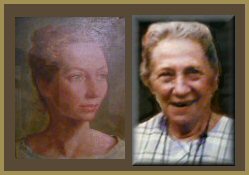
by Helen Nina Hope Dibbell, as told to her daughter Carola

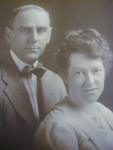
|
I can't remember when Cecil was a baby. But I remember when he and I were together. We had to be because Henry was such a bully. It took two of us, but between us we were able to tell on him. There was a popular saying in those days, "Wait till your father gets home." So we had to wait, which we could hardly bear to do. Pop was big, very big, he was six feet four, and his feet were correspondingly big, and he had these slippers which he used for punishment, and that was down cellar. When he got home, Cess and I would sit on the top step hugging each other, getting the benefits of the concert from downstairs. Whop! "I'll never do it again! Never do it again!" But he always did. |
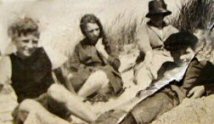 |
| Helen's parents | Helen and brothers (?) | |
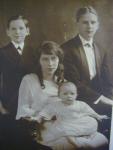
|
We were always kind of together, Cess and I. We were always playing together. I don't remember Henry playing at all; he was bigger. As a matter of fact, he helped with the family business. My mother and father had a catering business--on weekends, they made fancy ice cream, and Henry delivered it in his Express wagon. Bombes, I still have the pan. There was one that was a watermelon, green on the outside, pink on the inside, raisins soaked with rum. What I remember was one time my mother used salt instead of sugar. We got to eat that. | 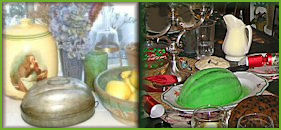 |
| Cecil, Helen, Henry, with Florence | Watermelon mold |
| Cecil Hope, my father Frank's father, had come to Horse Cove, North Carolina, from England--for a supposed-to-be gold rush, but he went to the wrong mountain. Cecil's father, Thomas Radford Hope, had already been to America on a trip. He'd been all over the place. He'd been to South America.The story is that Thomas was sent to the Americas to forget a girl, Mary Anne Manning, but after his travels, he went home and married her anyway. But that was the beginning of his interest in America. He always thought his son should go there.Cecil married Helen Bathrick in Horse Cove, and they came up to live in Chelsea, Mass. | ||
| Thomas Hope | Mary Ann Manning |
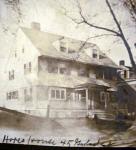
|
The Bathricks were multiple. Some of them had come up from Horse Cove, where my father was born. They'd gone down from Ohio, many boys, like thirteen. Evelyn used to tell me their names. My uncle Harry Bathrick was Superintendent of schools in Cleveland Ohio; Charlie and I stopped to see him once when we were driving cross country. Steve was his brother. Steve lived down the street in Chelsea and came up to the Hope house at 45 Garland Street which they had for a long time. John Bathrick the millionaire lived in California. Pop used to drive by himself, he drove out to California and saw John mow his own lawn. His daughter came to New York, and she was wild. She was rich and on her own in New York. Orrin Bathrick knew all about music. One was Eula. How and why they got all these people up to Chelsea Mass we don't know. |
 |
| 45 Garland Street | Helen and Radford Cecil |
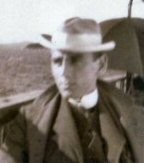 |
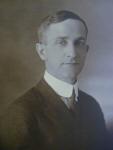 |
|||
| Helen and Radford | The family | Frank | Arthur | Evelyn |
Frank had to leave high school when his father died, to help the family by working. Cecil had died in an elevator crash. Arthur was crippled. His friends would come pick him up and carry him to the car. He worked for Revere rubber as long as he could. Ralph went into the Navy. He was big and round, just a plain gob--he always looked so cute, because, you know, you didn't usually see fat ones. He married the girl across the street, another Evelyn, and they had two kids, and one was Barbie, and one was Bobbit. They had a bungalow and I was entranced. Evelyn taught typing and stenography and perhaps a language, too. Evelyn played the cello. Ralph sang to entertain people. My grandmother sang "did you ever ever ever ever ever see a whale" and the answer was "no I never never never never never never saw a whale".
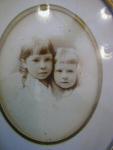 |
Both my mother Blanche Lovett and her sister Florence were musical. Florence was supposed to get married to someone popular, that's why she was sent to Smith but she didn't, she married Walter Bathrick.Florence was very popular. Lots of youngbloods around hoping for a favor. My mother just went to B.U. She married my father, who was not of the social standing her parents had in mind. My mother's mother's family, the Harveys, were from St Johnsbury, Vermont. Her name was Nina Sophia Harvey, and her two brothers were Fenton Harvey and Freeman Harvey. They named their children Fenton and Freeman, each for the other. This Fenton was Larry Harvey's father. I used to say to my grandmother, what are you doing, and she said, writing to my brothers. They were in Oklahoma and doing very badly. One of them married a French woman, Odette. Nina Sophia loved to read the dictionary. She'd taught the 18 year-old farmboys up in Vermont when she was 12. They were very religious and went to camp meetings in tents in Martha's Vineyard. | 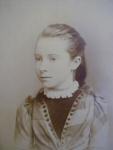 |
| Blanche and Florence | Blanche |
| My grandfather Deacon Charles Henry Lovett grew up in Salem, Mass. There was some awful story from what people did there in Salem-¬the boy who watered the milk was hung by his thumbs all day.I keep looking for that thing my grandfather wrote, and in it he mentioned the great Chelsea fire. He had what was called a brick block. I didn't know what that was. But that was what he had. It burned down and he lost everything. He and Nina Sofia moved in with us to One Franklin Terrace, in Melrose Highlands, Massachusetts, |
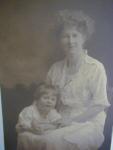 |
My aunt Florence and her son John Bathrick moved in too, after Walter Bathrick died of galloping pneumonia--in three days! Florence came in with her little baby, and I took out my doll called Evelyn (because Evelyn had given it to me) to show my cousin--my God, I thought, it wasn't a cousin, just a baby. | There was a lot of work to do. Because everything was work in those days. The big exciting day was laundry day. Because the fire had to be stoked up, because you had to boil your clothes, you twist and twist and twist to get the clothes so you could even bring it out to hang. My mother and Nina Sofia did it. Nina also had to make curls for Cess and me. You had to get a basin of water, and have to carry that, which was hard, to her who'd be sitting with a comb and a brush, and you'd have to revolve around so she'd get the curls. You put your finger in, then take it out very carefully. And Cess had them too, because you see that in that picture. Just before he had his first Dutch cut. |
| You know it's funny, what I remember is the lay of the land. It seems to me to get up that little street you had to go up a hill--I just feel that feeling. And I remember Pop pushed me the ice in a sled with a seat in it, skating, on Spot Pond; I had a little white muff. My friend was Dorothea Whittaker with a grandfather in Maine and I went up with her and stayed. We had a dog called Doctor. My mother was sick abed--I have a feeling it was a miscarriage. My father brought a puppy and put it on her bed and said here's your doctor he's gonna make you well. And I thought, my, isn't that witty! Doctor was always with us. English sheepdog, black and white. When he ran away, he ran away.And I remember sitting in the backyard while my parents made ice cream. They had a partner, Hope & Ormsby, and the end of that was when the partner ran away with the proceeds. They had something in the backyard, something in pens, hens, or it might have been rabbits, and it was supposed to add to the income.Then there was an interim house that I don't remember very well. There was a corner, and a school with a wire in front, and we used to get under the wire and play in the brook that was behind the wire, with pretty blue flowers. And that's all I remember, except I was sure there was somebody crazy in the house next door. We were abruptly moved from that, when Mr. Paine of Paine Webber sent him to New York. |
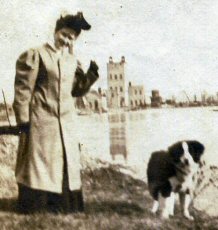 |
My parents went househunting in wartime and took a place that nobody seemed to want--it was really big, an estate, in Tarrytown, New York, and that was the place that I liked best. Later Charlie and I drove by once and seventeen families were living in that one house--it was that big. It had a driveway like the one at Darien, you'd come in and drive under a thing, a porte-cochere. You went in, and at the bottom of the stairs was a carved wooden bear, and he was standing on his hind legs in front of a tree, and in the crotch of the tree was a baby bear. And the rooms were sort of dark, with blinds made of dark wood, and the attic was really big--we rode bikes there on rainy days. There was a pond and we built rafts.
 |
The town was all on a pitch. The aqueduct was there, where New York got its water. It was like an English town. They had parades on every occasion--on one of the flat parts. We used to ferry over the Hudson for 5 cents and get an ice cream soda and come back. There were two castles. One was from the money from Detmar Woolens. Marymount Catholic School was there, with a lot of lawn; we had a lawn, but it went down in steps. Marymount had lectures, and lectures were what grown up people did on weekends, and they put on their evening clothes. | 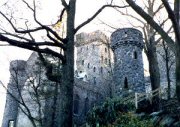 |
| Lyndhurst | Tarrytown Castle-on-the-Hudson |
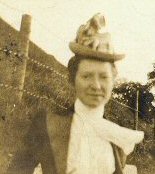 |
Mom liked getting dressed up. Grandma would come out and say, "Oh, Blanche!" when she saw Mom was wearing lipstick--Mrs. Albrys lipstick, and it was delicious! Tasted like strawberries. They used to wear hats with a kind of feather, but they had to stop--there were all those birds going around without feathers. Once Madame Walker (an early black entrepreneur who made her fortune from hair-processing cosmetics) came to one and watched from a box, and my grandmother said, "Imagine the nerve!" |  |
| Blanche, ca. 1900 | Madame Walker |
After school we had a slice of lemon and salt. Mom said we'd eat the lining right out of our stomach. Sometimes during those years they tried to send kids away because of polio so we went up to Portland Maine to Aunt Minnie and her husband who had a drugstore. She was Nina's sister. Florence Bathrick was working in New York as a teacher in a German school called the Froebel League.
My mother was always so sorry for me because I was in a small town so I had to go to dancing school--I don't think Cess went. And I had to take elocution lessons so you would talk clearly, and one of the things you had to do was learn this poem: "An Austrian Army Awfully Arrayed Boldly By Battery Besieged Belgrade." It went through twenty-seven letters. We left just before my 8th grade, I skipped the 7th.
My father missed the salt water so they moved to Stamford, Connecticut. That was when I decided we were no longer children. Florence and Quentin were born here. Cecil and I went to Stamford High School. He was getting interested in sailboats. Pop never sailed but he liked to be around salt water. In fact, many years later when they summered in New Jersey, he saved someone's life who was caught in a rip tide, and Pop had to go the hospital for days coughing up seaweed. Anyhow, Pop bought a cruiser in New Jersey and he learned to steer, and he came all by himself from New Jersey to New York Harbor and got stranded on a bar. We all said, what did you do? "I just went to sleep." Then the tide came up and he was on his way. We had wonderful trips on that cruiser.
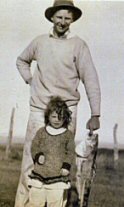 |
Henry got into terrible trouble in those years. He got kicked out of every school he got sent to. He and his buddy Horton Ford got into the high school after hours, and there was a wheel in the hall, that turned on the water for all the hoses, and they managed to flood all the ceilings. So he wasn't a fit graduate. They sent him to a private school. And graduation was coming up, and this also had the same kind of a driveway as Darien, and there were a lot of visitors crowding up the driveway, so he drove across the lawn, and the lawn got ripped up, and they said, you're not graduating from this school. I think Pop bought his way out of that one. |
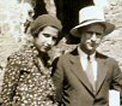 |
Henry went on to Connecticut Aggie, and the college called and said, "Where's Henry?" He'd gone down to New Jersey because he'd met a girl. He had a job working for Edison, I don't think he was in the office! Then he tried Columbia. Then he went to art school in Brooklyn. Later Henry married Dorothy who was Jewish, and he brought her up to the house, and the story is, Pop said here's 100 dollars, I never want to see you again. Mom straightened him out. She told us kids, "You might have been Jewish yourselves," because before she married Frank her next-to¬neighbor, Morris Karo, whom she was very fond of, was Jewish. |
Cess went to Yale and I went to Barnard--majored in Psych because my mother wanted me to do English. When we were at college we took some car trips, one to Oregon. On that trip we visited my parents' friends the Wrights--I think they knew them from Marinette, Wisconsin. He was a doctor, and he took my tonsils out when I got there. He said, you can't leave until you can swallow oatmeal. Cess said, "Come on, swallow, so we can remember when we left how Cess kept saying, "Stop spitting on the car!"
We also took a trip after I'd graduated from Barnard and then went to the University of London. At the end of that semester, Cess came over and met me in London and we went to Vienna and back up to Germany. We took classes with a little young fraulein, she said, "Ist das nicht ein rote Bleistift?" We would say, "Ja das ist ein rote Bleistift." And we used to go up this big hill and all the signs said do not run down this hill, it was so steep. We used to go around and sit at cafes and drink kaffee mit schlag. Then he went home and I went to Denmark. And this fellow on the train kept saying, "Ich bin Baier," and he was a baker.
The summer Cess graduated from Yale Pop woke Cess up every day at Belle Island saying when are you going to get a job? That was when Flo and Cess decided to get married. He joined the Navy because that was how he could get married. He had taken Naval ROTC in college. So he knew something about it, and beside they did a lot of boating and sailing around Belle Island, he and Henry would go off and be gone for two, three days.
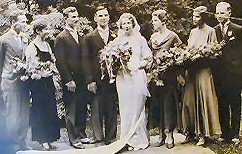 |
We didn’t know Flo. We were very surprised because they looked just like each other. We thought she was great. Charlie and I were already planning to get married in September, but Flo wouldn't wait for us to be married, she said "We'd be junior couple if we all got married together." So we all went up to the Little Church Around the Corner in New York, it was like 23rd and Fifth Avenue, a romantic kind of place, it had a romantic aura.
At the wedding was Pop, not Mom. I was shopping with someone, I think Dottie, and I said, hey, I got a wedding to go to, want to come? Flo’s family did not come down. I remember Cess needed a suit, and we went to Barney's, and it cost $15, and we always laughed when Barney's became so expensive, because that was the cheesiest place we could think of. Pop took us to a very swell place for lunch. |
Everything came at once, because the depression had Pop worrying about the expenses of the house. Henry had spent the summer in bed, he had TB. So after Cess and I each got married, Blanche closed up the whole house the next week and took Henry to Switzerland for the cure, and Florence and Quentin with her, and they stayed in Europe for seven years. Dottie was left behind and she used to come over to visit Charlie and me in the Village and cry every night, and finally Pop just gave in and sent her over to Europe.
Cess and I didn't see much of each other after we were married because the Navy took Cess out to California, until the fleet came here. He did remember one visit when the Chicago went to Provincetown, and we had a visit on Cape Cod. We all rented a house to stay in. He just had to go back on ship early in the morning. That was B.C.--before kids. And once I asked him the name of his Navy buddy, and he remembered. He wasn't remembering much at that time. I'd say, remember the ice wagon, in Melrose Highlands? He'd say, "I don't remember, I don't remember." But he remembered that.
Harve and Flo were prepared to buy a farm in California. They'd taken a trip to Washington and been so impressed by a farm vacation they'd taken there. So then they found out the fleet was going east. So they thought, let's wait to buy this farm, and then they started looking for a farm in Maine when the fleet came east and was in the New Hampshire Navy yard.
On the way back, they came back Monday morning, and they woke up early to drive down and ran into a dairy delivery van and Flo lost her front teeth. She used to love to take out the false four teeth, and that was another point in her favor--they were great entertainers.
They found Bremen on that trip. It was so cute. I didn't know that Flo's father had an antique store, he lived near enough so they could get his things. We were amazed that Cess knew how to do all those things. He built the barn, he built the chicken house because he got a lot of chickens, and he learned this all from somebody called the Agent, state agent, and he taught Cess to do all these things. And Flo fixed that house--every inch, decorated by Flo. And we had a visit there, and we were just enchanted. There was a back porch where we used to eat, and it had a railing, and Cess would sit there with his back to the railing, looking for trouble, and he'd find trouble, grab his gun, and shoot a hawk. And we thought, what a life. He had a horse and Flo would take a ride every evening. And Cess didn't, he was afraid, he didn't want to take a chance. At the same time there was such a big depression that there were a lot of fellows in his class who went into agriculture. And a few were in his neighborhood. I think one had a silver fox farm. And both of them, I think, didn't make it.
They asked us if we would be able to come up for a week when Sandy was a year old so that Harve and Flo could take a week off on an extended cruise. They asked us because they knew Charlie knew how to farm because he'd done that sort of work. Sandy had to go with Charlie--she had to grab his finger, and she wouldn't go without her doll, a ragdoll named Poppy because it was given to her by Pop.
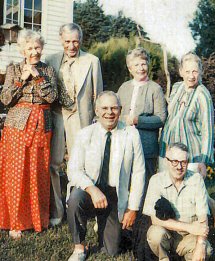 |
Sometime in the 90’s, Cess and I started a tradition of phoning each other every Sunday. Flo was becoming sick and occasionally had to go to the hospital. A little after that, Charlie took to bed. Cess used to tell me the news about who came. Though he usually forgot who it was. I think I tired him from talking so much. He would say, "Your voice is getting weaker." I would say, "No, you're getting hard of hearing." He was doing all the cooking at that time. When Flo went into the nursing home, he visited her twice a day. Three years ago, after Charlie had died, I went up to Maine again with Joy and Larry for Flo's memorial. It was a very, very nice visit. We used to wish he could come down to New York and see everyone here. All these things I remember from such a long time ago, they happened to us both, because we were always together when we were young. Cess was a wonderful brother, almost like a twin. He was generous, even-tempered, and he was always funny. He was my dear companion all the time that we were growing up. And it never stopped. |
--as told to Carola Dibbell and Nina Dibbell Christgau, June 2000
 Go back to Family Stories Page
Go back to Family Stories Page